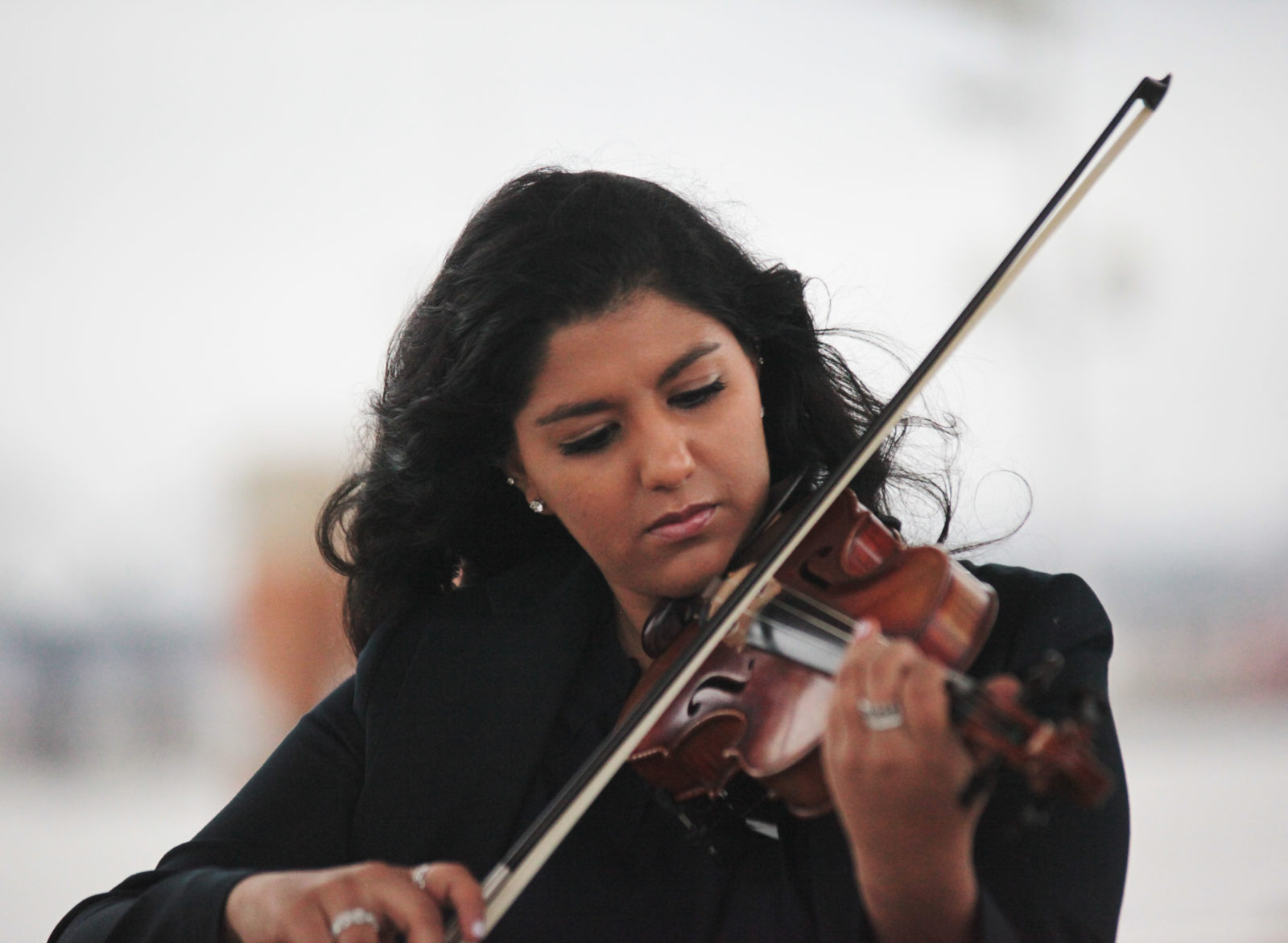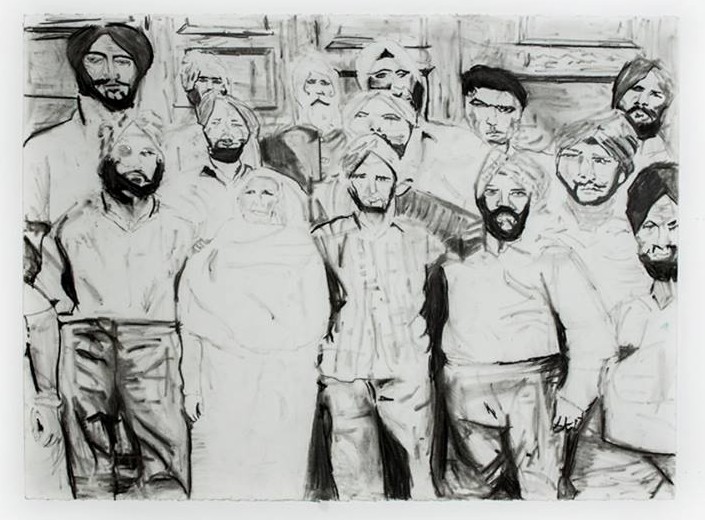Editor’s note: Kamneev Rai, a violinist and the performance coordinator for the Baltic Academies Orchestras, passed away on Feb. 13, 2023.
To read more about her life, keep reading below and visit:
Kamneev Rai ’16 finds illness sharpens her focus on music
Seeing a need, taking action in Ukraine
Kamneev Kaur Rai serves refugees in Poland
Kamneev Kaur Rai, a violinist and conductor, shares with us her educational and career journey. She talks about what it’s like to blaze new trails and the joys of working on projects she loves. Often times a lot of us just aren’t aware of all the career options out there. So, in an effort to highlight non-traditional career paths and to inspire Kaurs to explore different educational and job options, Kaur Life launched a new series called “Kaur Careers.”
Name: Kamneev Kaur Rai
Occupation: Violinist
Education: Augustana College – Bachelor of Fine Arts Degree in Instrumental Music Education, General Music – Orchestral Conducting, Business Administration – Finance
DESCRIBE WHAT YOU DO AND WHERE YOU CURRENTLY WORK?
I am a graduate student at the Chicago College of Performing Arts. Prior to this, I was working in Estonia as a violinist and performance coordinator for large music events. I was lucky enough to work with widely accomplished and respected instrumentalists and conductors from that side of the world, whether it be performing with them in the orchestral setting, accommodating performance administrative tasks to new music experiences, and studying conducting practices. Before that, I was a music educator K-12 as well as the special ed classroom, which has by far been the most rewarding position I have held to date.
DO YOU HAVE A DREAM JOB OR PINNACLE YOU’RE WORKING TOWARDS?
My dream job would be as a music professor for a liberal arts music conservatory or a dedicated conservatory in the country. This would also include maintaining my status as a professional violinist, which implies I will need to perform with professional ensembles (i.e. orchestra, small chamber ensembles, etc.)
WHEN AND HOW DID YOU REALIZE THIS WAS THE CAREER PATH FOR YOU? WHAT WAS YOUR CAREER JOURNEY?
I had always known growing up that I would be involved in music somehow. However, coming into my career highlights have been accidental or by chance. I was lucky to be placed in the music education track right as I began college, and so I began my training in the education department and the music program very diligently. Along the way, I chose to study abroad in Paris, and I found that the understandings and perceptions of the role music has in society is vastly different in the USA versus Europe.
There, I realized the arts are a part of the general culture of society, and this is a goal for us artists to strive for – transforming an isolated arts community that we have here to an integrated one.
When I returned to my junior year, I knew I wanted to study conducting very seriously, and I was lucky that my orchestra director was a well-known conductor. I declared my intention to him, and he accepted to take me on as his one conducting student, and his mentorship to me began. As a result of these studies, I was accepted to a conducting festival in Estonia, and I was ultimately asked to conduct a piece in a professional concert in Parnu, Estonia, and I continued to go back afterwards. The connections made during these festivals allowed me to be invited to perform full time, which was an opportunity I could not pass up. The musicians were top notch, the music was the most rigorous, and we were rehearsing or performing all the time. It bumped my skill set up to a level I did not know I could attain without further studies in an arts program, and I am so grateful for realizing out the dream of practicing until you improve to the level you want to be at.
After this, I was diagnosed, and so halted my professional journey, as my medical journey began. During this year, I decided I wanted to waste no time once treatment was over in my mission to change societal perceptions of music and the arts having a huge impact in our education. I feel my voice will best be heard if I am directly working with those individuals moving on to find their respective paths.
IS THERE A TYPE OF MUSIC OR STYLE YOU SPECIALIZE IN?
As a violinist, I specialize in music from Baroque to Classical, to Romantic, to 20th Century to Modern. As a conductor, I specialize in specifically orchestral works Baroque to Modern and everything in between, as well as some small-sized choral works set in a romantic style or tonally in modern notations.
WHAT DO YOU ENJOY MOST ABOUT YOUR JOB?
I enjoy learning the various personalities of the musicians I meet. I think oftentimes, people have a view of professional musicians and how we act or how others perceive us. In my experience, everyone is so dynamic and so different in their likes and interests outside of the performance hall. The intricacies of their journeys to get to this stage are fascinating.
CONSIDERING IT IS NONTRADITIONAL, WHAT WERE YOUR PARENTS’/FAMILY’S/ SANGAT’S REACTION TO YOUR CAREER CHOICE? IF NEGATIVE, HOW DID YOU DEAL WITH THEIR RESPONSE?
My parents and family began by trying to steer me to a more “appropriate” profession. Mom, dad, uncles, aunts all gave me a disapproving look suggesting my interest was naive. This was confusing because they benefit from our musical abilities whenever they have a kirtan. I chose to use that as leverage. From when Lakhpreet bhenji (founder of Kaur Life) first sat with me to teach me how to play a scale on her dilruba, to the workshops I took afterwards, to the formal training I had partaken in with Raj Academy conservatoire of Sikh Music, my practicing kirtan in the community was appreciated without a doubt…until I chose to let this be my profession.
I made a deal with my parents that I could major in music as long as I also majored in business. This way, if their worst fears were realized (that musician jobs are rare to find) then I have a business degree to fall back on and find employment.
During my undergrad education, I was little by little sharing my experiences, performances, and showing my pride in my work to my family. This was enough for them to attach music to my identity, and I feel they knew my contentment and happiness in life was bonded to my active participation in the arts. So, when I moved to Estonia to be a violinist, they knew if my heart was in it, I would be fully feeding my soul.
Their fear was that I would lose myself in that lifestyle and need to be grounded, and they were right. A detachment from my sangat, from my ability to contribute to Sikh camp, and from my journey to my Guru were all at a pause because if my performance goals. This is another factor into what led my decision to stay in the United States and further my studies in music here. Going through diagnosis like this really bonds a family to new heights, and now, it has been made clear that whatever path I choose to go, I know I am considering all aspects of my life being at balance and how I can best contribute to society and this world. Through all of the trials and tribulations given by my family since my youth, I have been blessed over and over again by my sister,Upahvan, who has believed in me and my ability to accomplish what I set out to in the arts world no matter what. She has been my biggest advocate and made the battles with my parents much easier to handle.
HOW DO YOU FEEL SIKHI INSPIRES YOUR WORK? WHAT ELEMENTS OF SIKH VALUES ARE IN YOUR WORK?
Our Sikh musical heritage is very rich; however, so much goes unrealized, as the European influence of vaja has taken precedence on the kirtan stage. There is so much more to what kirtan can bring to our understanding and enlightenment of Gurbani, and I feel it is my responsibility to allow others to experience that even if it just by listening.
As a violinist, I’ve found Western music was realized to allow the physical world to become connected to the spiritual. Being a Sikh allows me to continue these musical connections with a more open-mind and heightened sense of self. It is very easy, especially in the arts world, to get caught up with our ego and self-image and to let that guide our decisions; however, my Sikhi has seriously brought me back to assess why I do what I do.
Our Sikh history is rich, specifically in fighting for others and their rights and access to things. For me, that thing is music. This is not a common path for our community. To date, I will still get comments from members of our community suggesting I choose a financially stable career path. While I understand their concerns, I am also reminded of the campers that are excited to tell me they also play an instrument at school. This leads me to believe I could help to pave the way for other budding artists to feel confident in their paths because it has been done and can continue to be done. I know I will always advocate for them, and just that fact alone is reason enough to continue.
WHAT LESSONS HAVE YOU LEARNED ABOUT SIKHI THROUGH YOUR WORK?
Surprisingly, I have learned to accept Guru’s hukam. The Creator has truly a Divine Order for us, and we may not always like what occurs for us at a given moment, but ultimately more and more is revealed, and we realize how blessed we actually are for the things Guru has placed in our paths. At age 14, I was simply a high school student who loved the feeling of creating an advanced sound and musical product with a team of musicians. I simply wanted to continue playing for that enjoyment (my hobby).
At 17, I *accidentally* applied to the college I was accepted to, and my audition was basically set up for me. I always thought I would satisfy my parents to study business, but my randomly assigned Freshman academic advisor heard I was in orchestra and placed me in music theory right away. At 19, I got rejected for one student trip but was recommended to study abroad in Paris, where I heard orchestra in a new light. At 21, I was accepted to learn as a conducting student in Estonia and ended up being asked to conduct in the concert. At 22, I started teaching elementary and junior high students in the general music classroom and orchestras. What began as proof that I could be successful as a teacher became a pure love for students and an understanding of the education system in America that could not be replicated elsewhere. Finally, I moved to Estonia to perform with the same orchestras I conducted, and it was a most unexpected love of performance that grew. Out of all of the titles I had claimed, the last one I would have given myself was as violinist, yet I have grown so fond it in recent years. Each of these events were completely unexpected, but they have resulted in growth and opportunity to learn.
As “Sikh” means “student”, taking every moment as a learning opportunity is crucial. This is true not only as an event occurs, but also in moments after as reflection. Perspective is everything, and being empowered to reflect gives us more ability to have compassion for others, which is what has most certainly occurred in these series of events.
WHAT ADVICE DO YOU HAVE FOR YOUNG KAURS WHO ARE UNSURE OF WHAT CAREER THEY SHOULD PURSUE?
Whether you follow the advice from your family/friends/community/etc., please listen to these individuals and weigh your options. Explore various avenues in the things you like and the things you may be good at doing. Put yourself out there for many opportunities, even and especially the ones that you do not think are for you. Finally, let the universe call to you as well. Your Guru will always place things your way.





1 Comment
Jaswinder kaur
02/25/2023 at 6:50 pmKamneev has a beautiful soul, she contributed so much in a short journey.
May Akal Purakh stay with her soul for ever.